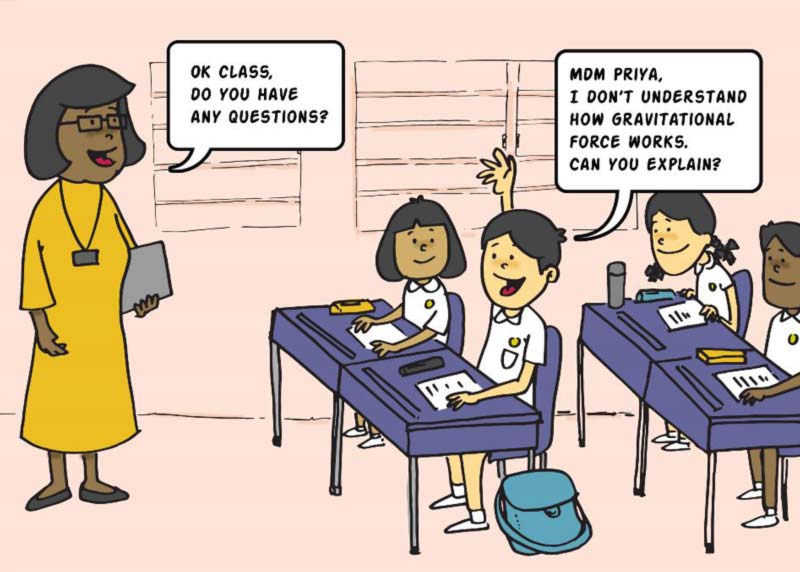“Have you done your homework?”
“What about your spelling revision?”
“How many times do I have to tell you…?!”
Sounds familiar? If you have been repeating these words to your child day after day or multiple times daily, you are not alone.
Nagging is not a strategy we parents consciously set out to follow to spur our kids on to become responsible, successful individuals. But when we see our child distracted, slacking off in front of the TV or not trying hard enough, it just happens.
I was guilty of it, too. But I have realised that underlying this one-way mode of parent-child communication was really the issue of trust and empowerment or rather, the lack thereof.
All too often, we hear frustrated parents say their children are “lazy”, “unmotivated”, “lack independence” and hence, cannot be trusted to complete tasks on their own. A feeling of distrust sets in and the nagging starts. But this is self-defeating.
Research, including one study published in the Journal of Applied Developmental Psychology in 2017, found that children need some level of autonomy to be engaged in their learning and take responsibility for their school work. Nagging is not the way to go about it.
Learning not to nag
Having grown up in an environment where nagging and threats of punishments were common, but never really effective, I was keen to explore different ways of interacting with my children when I became a parent myself.
It has not been an easy journey.
While setting boundaries for my daughters, now aged seven and 13, was relatively straightforward when they were toddlers and pre-schoolers, the real challenges kicked in when they entered primary school.
No longer did parenting revolve mainly around mealtimes, playtime and potty-training, but more on how to foster independence, a sense of responsibility and self-discipline in my children.
How to guide my growing children so that they are motivated in school and carry out day-to-day tasks without constant reminders?
How can I stop nagging and learn to trust that my children are capable of making sensible choices in their day-to-day decisions (like complete homework versus play computer games) even when Mummy isn’t looking?
My lightbulb moment came after chatting with an expert, who has conducted research in children’s media habits, during the course of my writing work.
A father of four children, he shared how he had gotten his teenage daughter to sign a “contract” – listing usage parameters as well as his concerns and expectations of her mobile phone use – prior to getting her first smartphone.
The aim was not to forbid usage but to set clear boundaries – and make known the consequences of crossing them – so that children are empowered to know what they can or cannot do.
Setting expectations and boundaries – corporate style
It made perfect sense to me.
Since then, I have adapted this strategy, building a culture of setting clear expectations and boundaries at home. This applies not only to my children’s screen time use but also to other aspects like school work and household chores.
To do this, I set up an individual meeting with each of them – much like how companies carry out their annual performance review meetings with staff.
The meeting usually takes place in February to give them time to settle down in the new school year.
During the meeting, we hold a two-way discussion (which means, I’m not the only one yakking away but my daughters provide inputs as well) about things like their academic goals, screen-time use and delegation of household chores over the weekend. We negotiate ‘deliverables’ and consequences, like business partners, and I love hearing their creative counter-proposals to my suggestions. I know that when their suggestions are taken into consideration, they are less likely to go back on their word.
We then wrap up our “meeting” with a word document list of expectations and consequences, based on the discussion. For example, homework due during the school week should be completed by 6pm each day and bedtime is by 9.30pm.
This varies according to each child and changes every year.
Of course, the list is not cast in stone. The children are free to state their concerns, re-negotiate and we can adjust the list along the way when unforeseen circumstances occur, like during the Circuit Breaker period, or when school hours and homework load change.
We also sit down and problem-solve when they run into difficulties, for example, when they have trouble completing assignments or end up forgetting to do a piece of work.
I prefer not to sweat the small stuff. For instance, if they unintentionally go over the screen time for a bit or during weekends when there’s a special programme on. After all, even adults don’t like bosses, who are too finicky and micro-manage them.
Another point to note is that while each point on the list is specific (such as two hours of screen time daily), they are free to choose how to work out their own schedules. Providing choices and autonomy within safe boundaries can help children feel less pressured, which in turn helps improve their motivation.
For instance, they can have screen time in half-hour sessions over the day but they can also choose to binge-watch cartoons for two hours straight before attempting their homework.
Some people balk when they first learn that I conduct “performance reviews” with my children. “You sound like you’re running a company or boot camp, not a home,” a sceptical relative once commented.
The benefits
But I feel that it has worked for me and my children.
Whether it is a result of better communication, my daughters’ temperaments or a combination of other factors, the culture of instilling two-way communication and setting clear expectations seem to have forged a strong sense of self-motivation in my children as well as trust within the family.
On their end, my daughters seem well-adjusted and self-confident in their abilities. They are able to complete homework, revise their work and tackled home-based learning during the Circuit Breaker period on their own while I was wading neck-deep in my own pile of work assignments.
I find that I almost never have to nag at my children on issues like screen time limits, homework or revision (okay, I admit I still nag at them to eat their broccoli and pick up their dirty socks now and then. Those are not on the review list, by the way).
Today, I feel a sense of maternal pride when I see my seven-year-old switching off the television or laptop without reminders and when she works on her Chinese spelling using a schedule she devised on her own.
For example, she figured that starting a week ahead of time and learning the words in small, manageable doses was a lot less stressful than learning all 10 words in a go.
Daily bickering between the siblings and blow-ups on my end have also dropped significantly.
I must add that all of these did not happen overnight. There were times when I had to bite my tongue and learn to trust instead of interfering in the process.
For example, it would be all too easy as a form of habit to remind the children “have you finished your homework?” at 5.30pm when the cut-off is actually at 6pm.
By focusing on the big picture goal, I have also learnt to be discerning and let certain minor things slide (like broccoli and dirty socks). And when problem-solving, I remind myself to hear my child’s views and ideas without rushing into instructing her on what to do.
The culture of two-way communication and problem-solving seems to be helping my older daughter navigate the adolescent years, which we all know can be tricky and full of speed bumps.
For example, I was pleasantly surprised when my older daughter, now in Secondary Two, deleted her favourite online game app on her own weeks before her tests because she found it distracting. She re-installed the game after completing her tests.
She also recently shared how she came under peer pressure to participate in something that she had deemed was unsafe, and asked my husband and I for advice.
During the course of our discussion on how to deal with the situation, my husband suddenly said to our older daughter: “You know, it has never occurred to us not to trust you fully. We know you can make good decisions.”
Hearing my husband’s words, I felt a surge of emotions. We are far from perfect as parents but while fumbling along on this parenting journey, maybe we have really managed to forge something precious within our little family.






